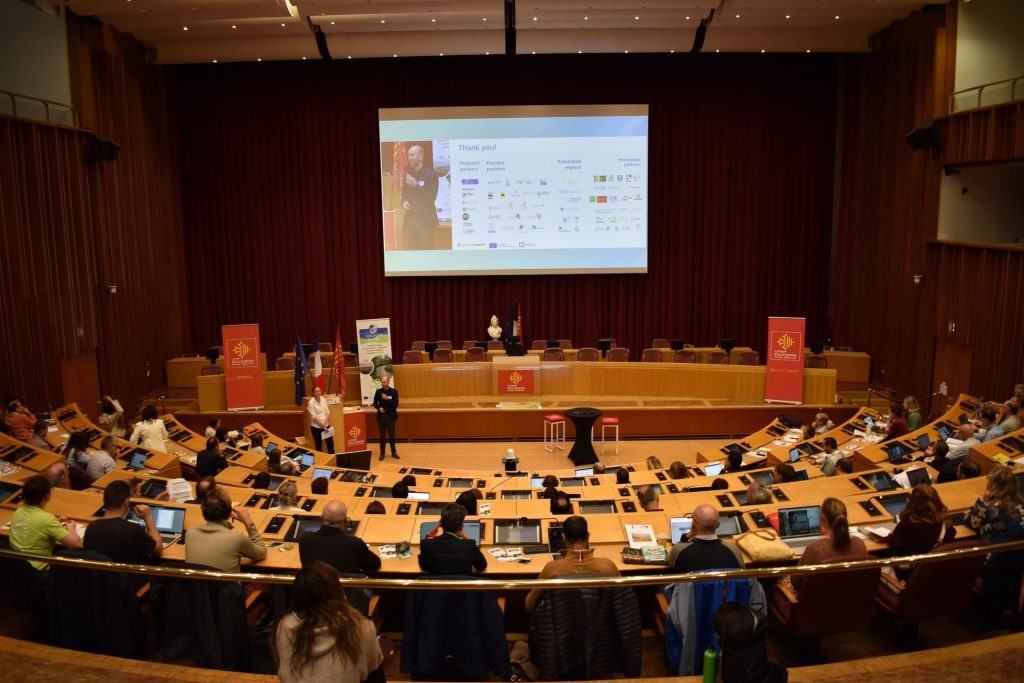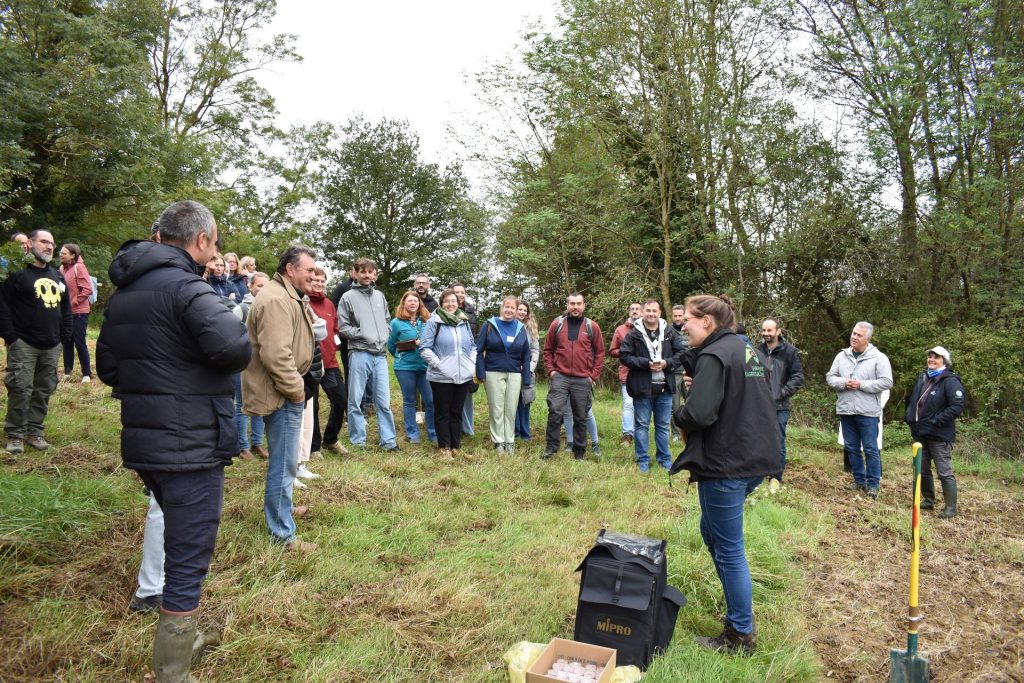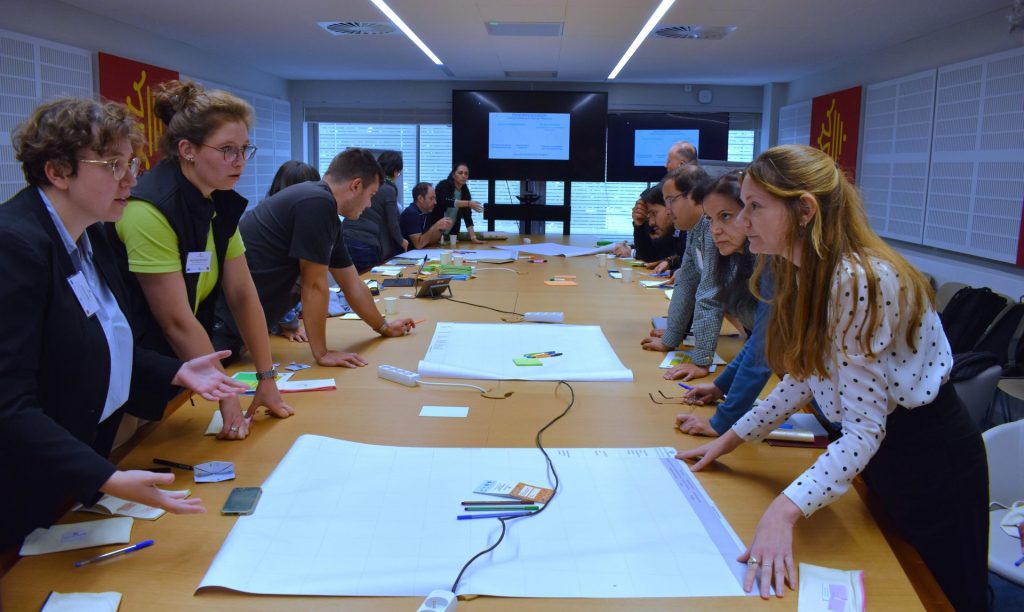More than 100 researchers, practitioners, and regional representatives gathered in Toulouse, France, from 24 to 26 September 2025 for the Horizon Europe SpongeWorks second General Assembly. Scientific and implementing partners, water managers, local farmers, regional stakeholders, and representatives from the three SpongeWorks demonstrator basins and eight Associated Regions shared insights, knowledge and progress on sponge measures, 12 months after the project’s launch. Together they explored pathways for scaling up sponge strategies across Europe as a natural defense against floods, droughts, and other climate extremes.

Dr. Christian Albert (Project Coordinator, LUH) and Dr. Ellis Penning (Project Co-Coordinator, Deltares) opened the meeting, which was hosted by the Région Occitanie in Toulouse.
Dr. Christian Albert (Leibniz University, SpongeWorks Coordinator) emphasised the societal dimension:
Sponge measures are not just about managing water — they are about safeguarding our communities against extreme weather, strengthening resilience, and ensuring that local voices help shape solutions at the heart of European Union decision-making.
Dr. Ellis Penning (Deltares, SpongeScapes Coordinator and co-coordinator of SpongeWorks) stressed the power of partnerships:
By building synergies between local and European projects on sponge measures, we turn isolated efforts into a connected movement — accelerating implementation, amplifying impact, and making landscapes across Europe more resilient to climate extremes.”
Spearheading Europe’s sponge agenda
SpongeWorks, together with its sister projects SpongeScapes and SpongeBoost, forms the spearhead of the EU’s efforts to restore the natural water retention capacity of landscapes. This approach is central to the new EU Water Resilience Strategy, which calls for action to “redress the natural sponge function of our landscapes in order to replenish groundwater reserves and safeguard biodiversity.”
Funded by the EU and UKRI, SpongeWorks has completed the first of its four-year journey. The project is implementing 19 sponge measures across 4,000 hectares of land and 47 kilometers of river in three regions: the Lèze (France), Pinios (Greece), and Vecht (Netherlands/Germany). These measures range from hedges, buffer strips, and infiltration ponds to large-scale restoration of rivers, wetlands, and peatlands.

On September 23, a field trip was organised in farms in the Lèze Valley and participants witnessed first hand the sponge measures applied in the French demonstrator.
Milestone achievements include:
- Pinios River Basin (Greece): A unique SpongePark is taking shape — a 2-hectare living showcase of sponge measures combining low tillage, mulching, terracing with water harvesting, and buffer strips. To bring this vision to life, the Municipality of Trikala in Greece is collaborating with Leibniz University Hannover to launch a student design competition. Meanwhile, in the western part of the basin, SpongeWorks has achieved a national first: the introduction of strip tillage farming with a specialised machine. This pioneering step supports soil health, enhances water retention, and is expected to significantly reduce farming costs, already yielding promising results.
- Lèze Valley (France): CNRS has installed the valley’s first groundwater monitoring probe, tracking how the aquifer responds as sponge measures are introduced. This cutting-edge tool monitors water quantity, temperature, and conductivity, and sheds light on how sponge measures act as natural filters during flood events. In September 2025, SMIVAL, working closely with local farmers and communities, installed two beaver dam analogs as part of an effort to disseminate low-tech sponge measures.
- Vecht River Basin (Netherlands/Germany): Hardenberg Municipality is creating a new green bicycle route, including depaving large areas to enhance infiltration, adding permeable green car parking spaces, and expanding green zones.

Participants provided their opinions and input during five parallel workshop sessions dedicated to the project’s key outputs and activities.
Scaling impact across Europe
The General Assembly also convened the eight Associated Regions that have joined the SpongeWorks journey. These regions, stretching across Europe, will receive tailored support to strengthen the sponge function of their landscapes, turning climate challenges into opportunities for renewal and resilience.
About SpongeWorks
SpongeWorks is a leading Horizon Europe initiative in nature-based climate adaptation, bringing together 27 partners and 23 knowledge institutions. The project is developing practical, scalable solutions for sponge measure implementation which address critical questions about effectiveness, financing, governance, and stakeholder engagement.
For more information on SpongeWorks, visit www.spongeworks.eu or follow us on LinkedIn.
Funded by the European Union. Views and opinions expressed are however those of the author(s) only and do not necessarily reflect those of the European Union or the granting authority, the European Climate, Infrastructure and Environment Executive Agency (CINEA). Neither the European Union nor the granting authority can be held responsible for them.
The SpongeWorks project has received funding from the European Union’s Horizon Europe research and innovation programme under grant agreement No 101156116 and from the UK Research and Innovation/HM Government. The project runs from 1 September 2024 to 31 August 2028.

